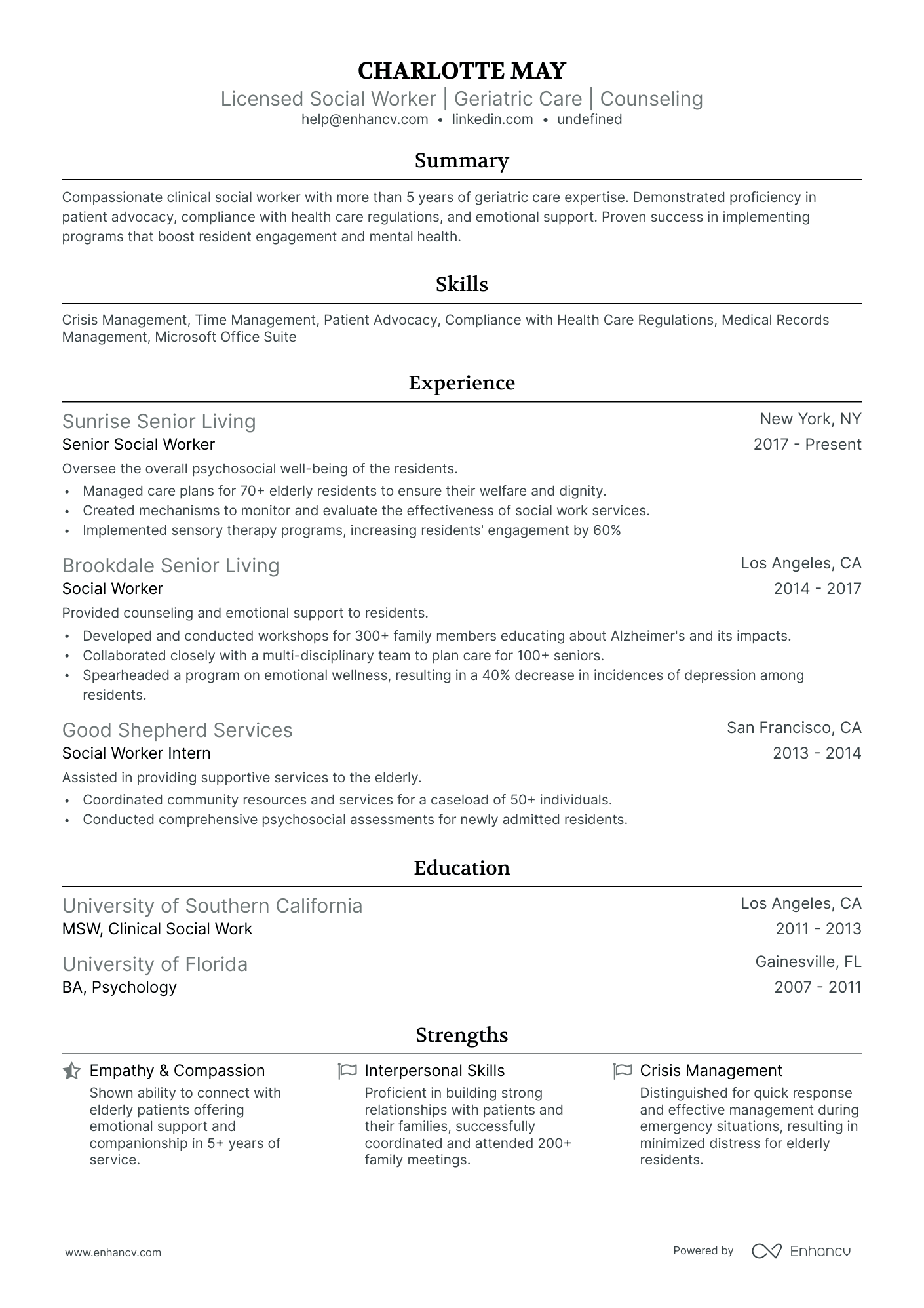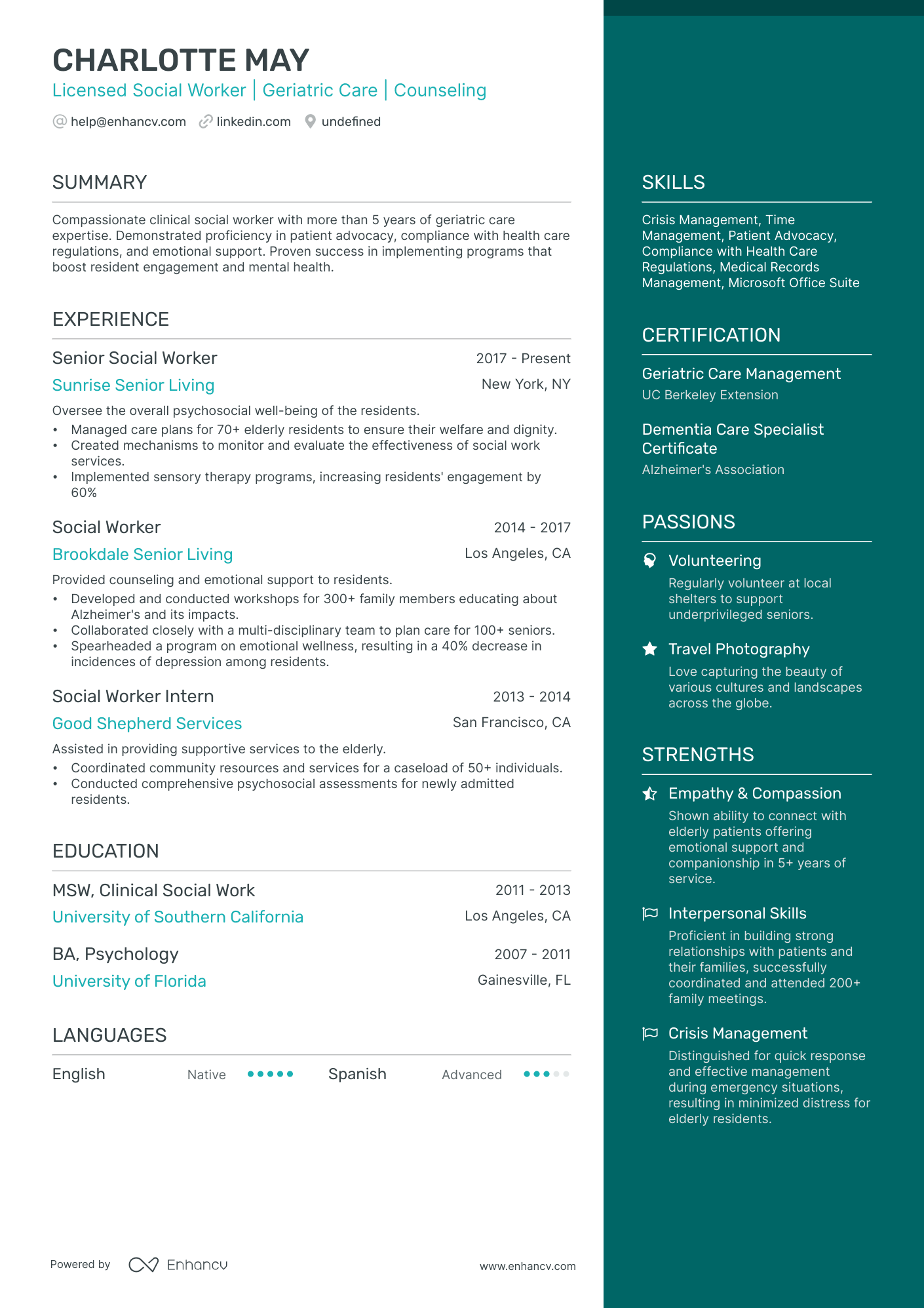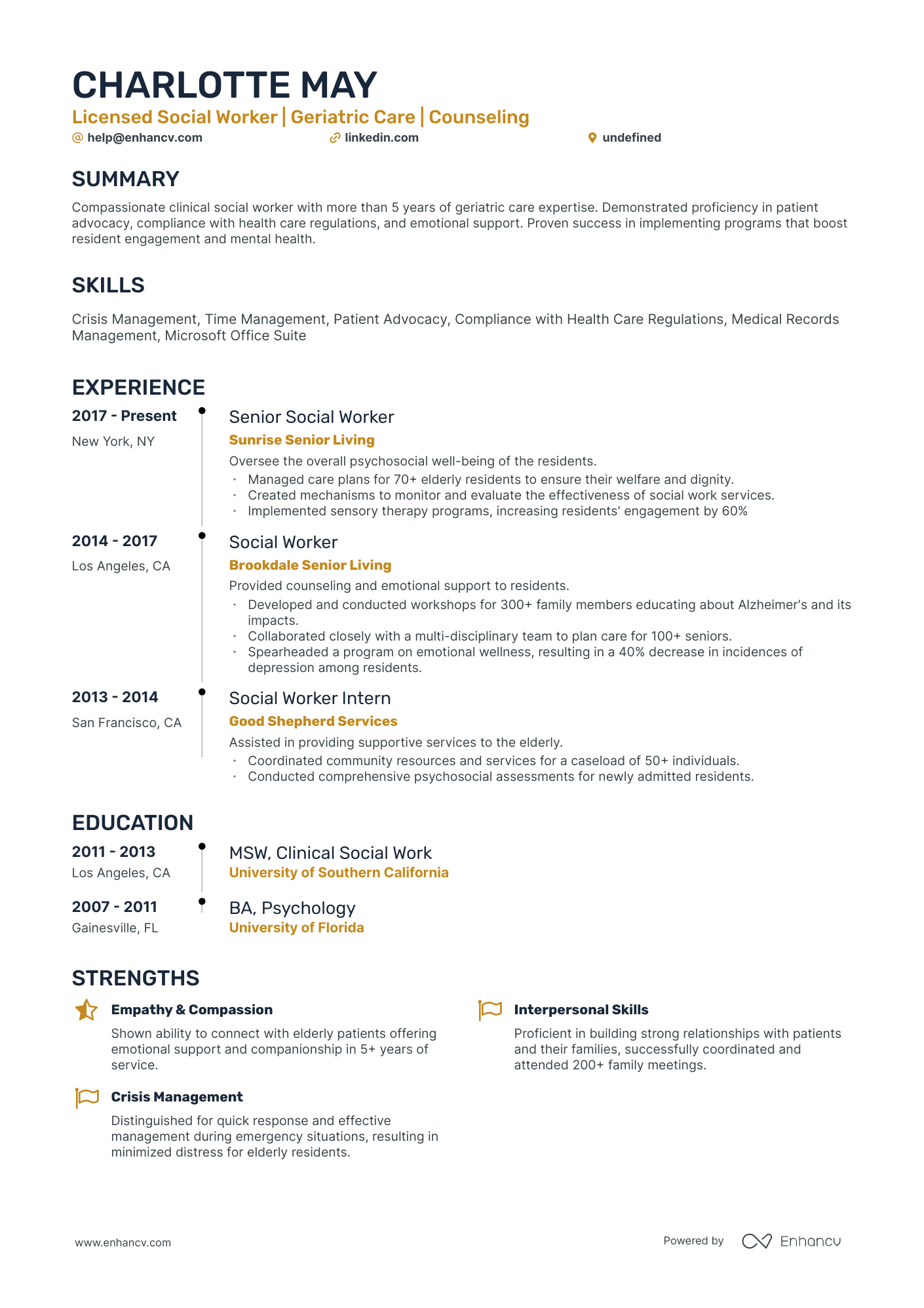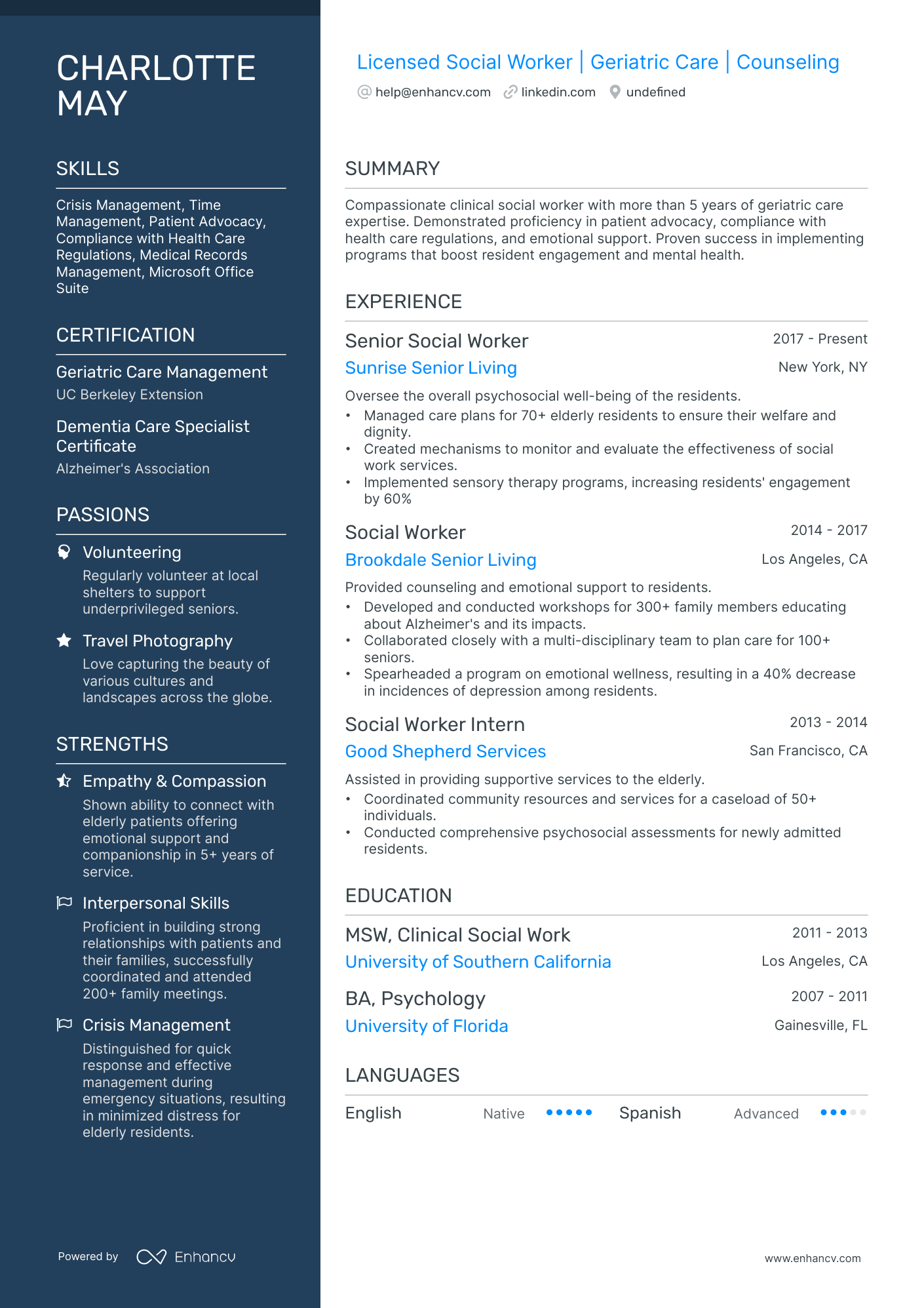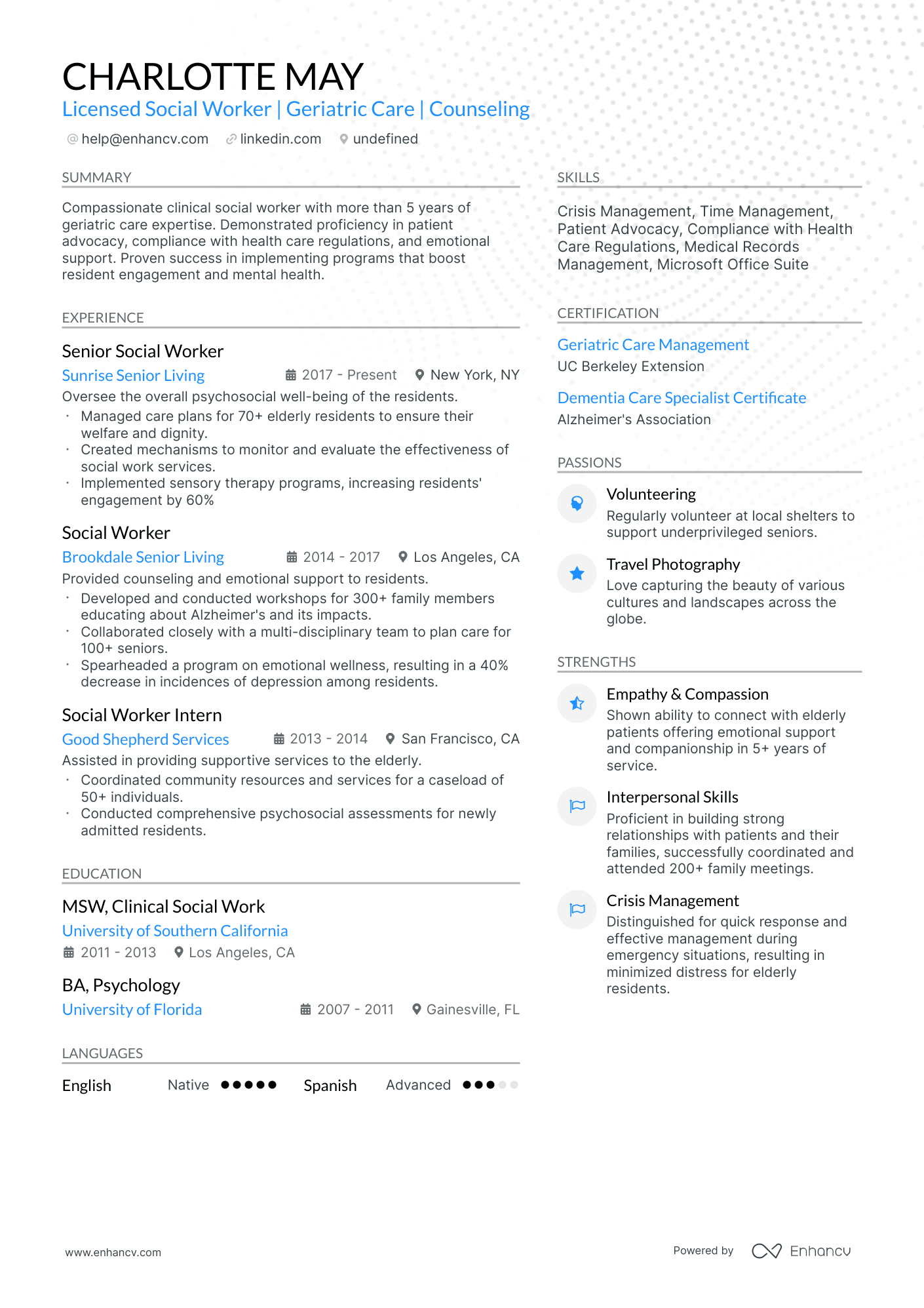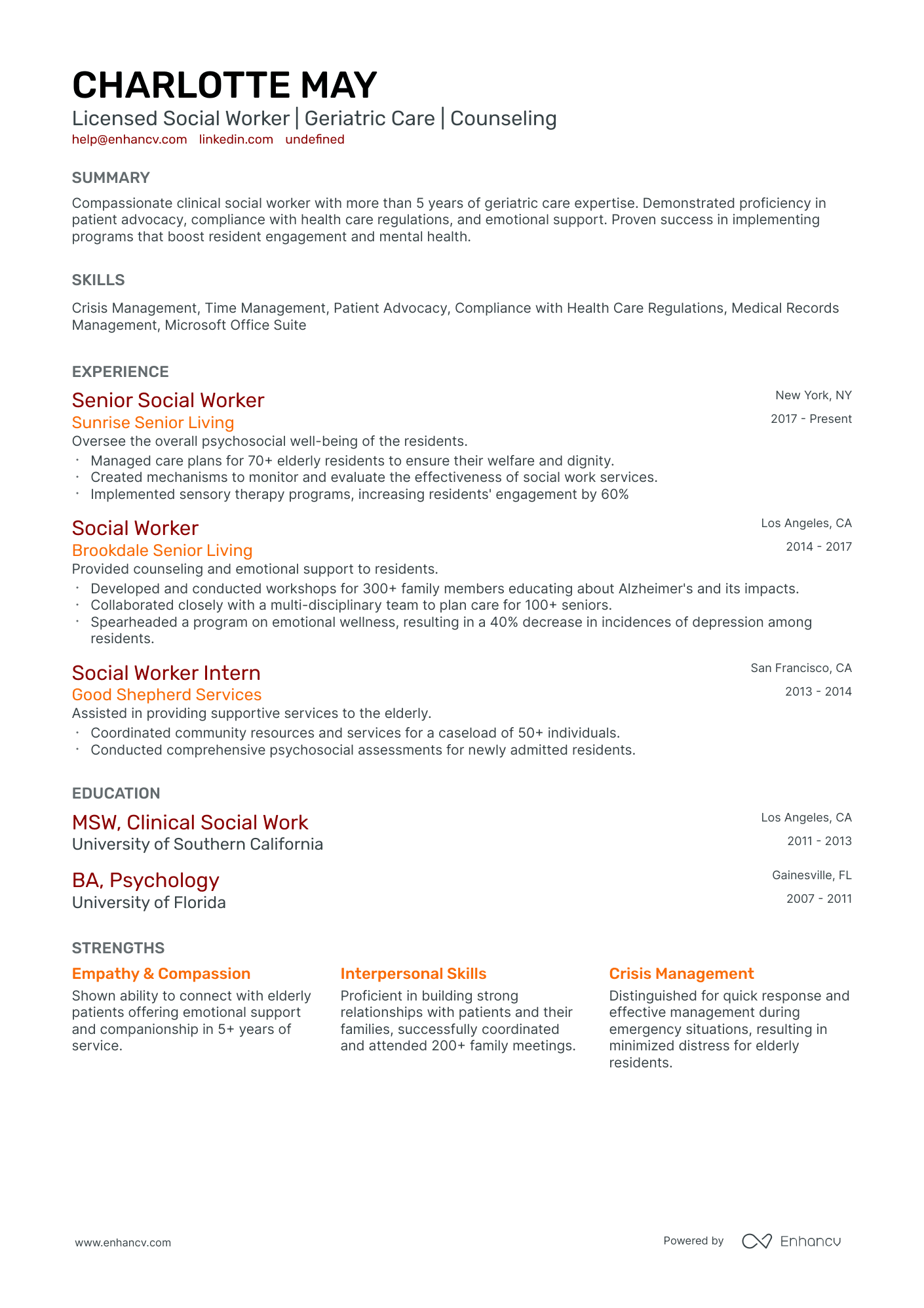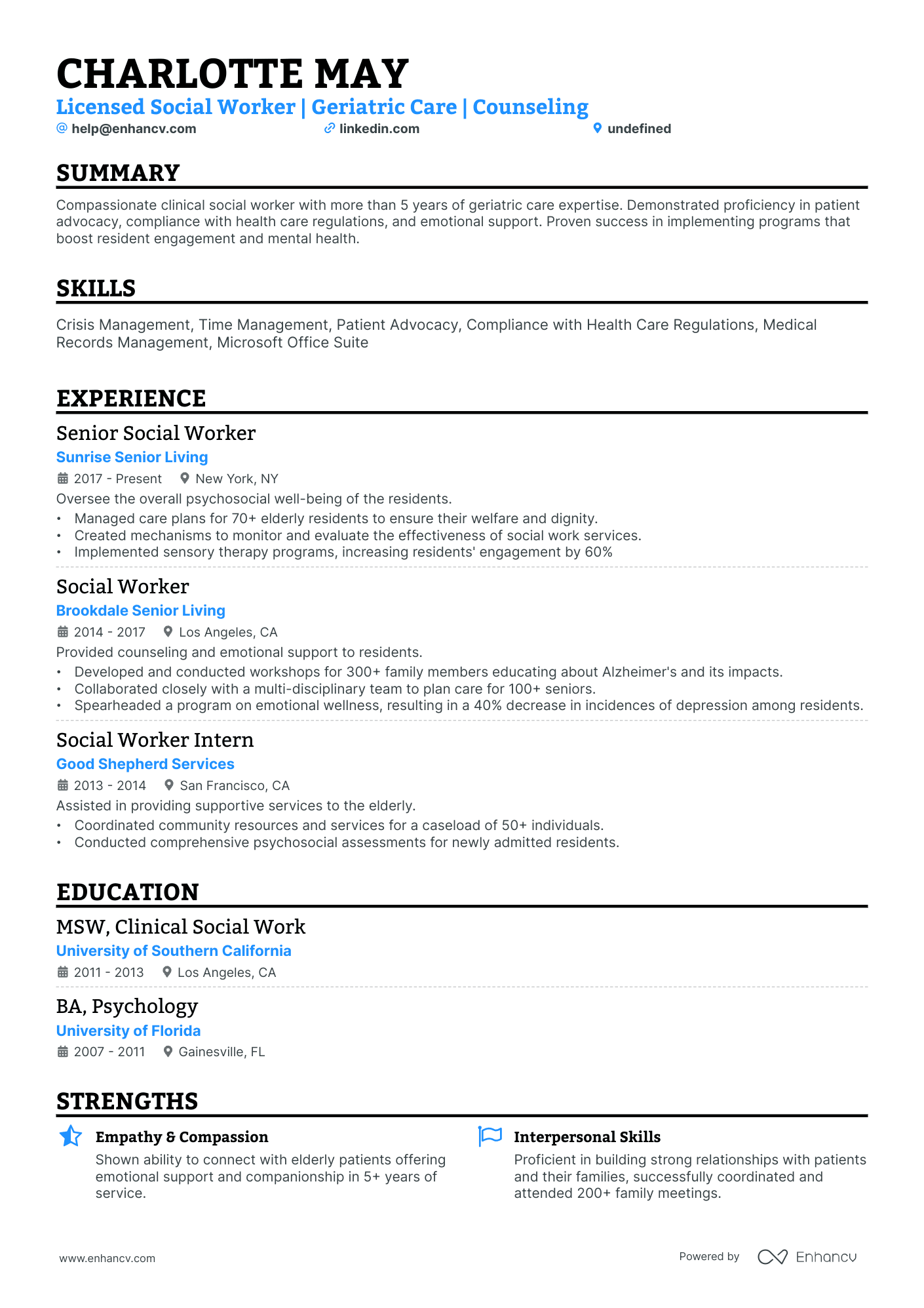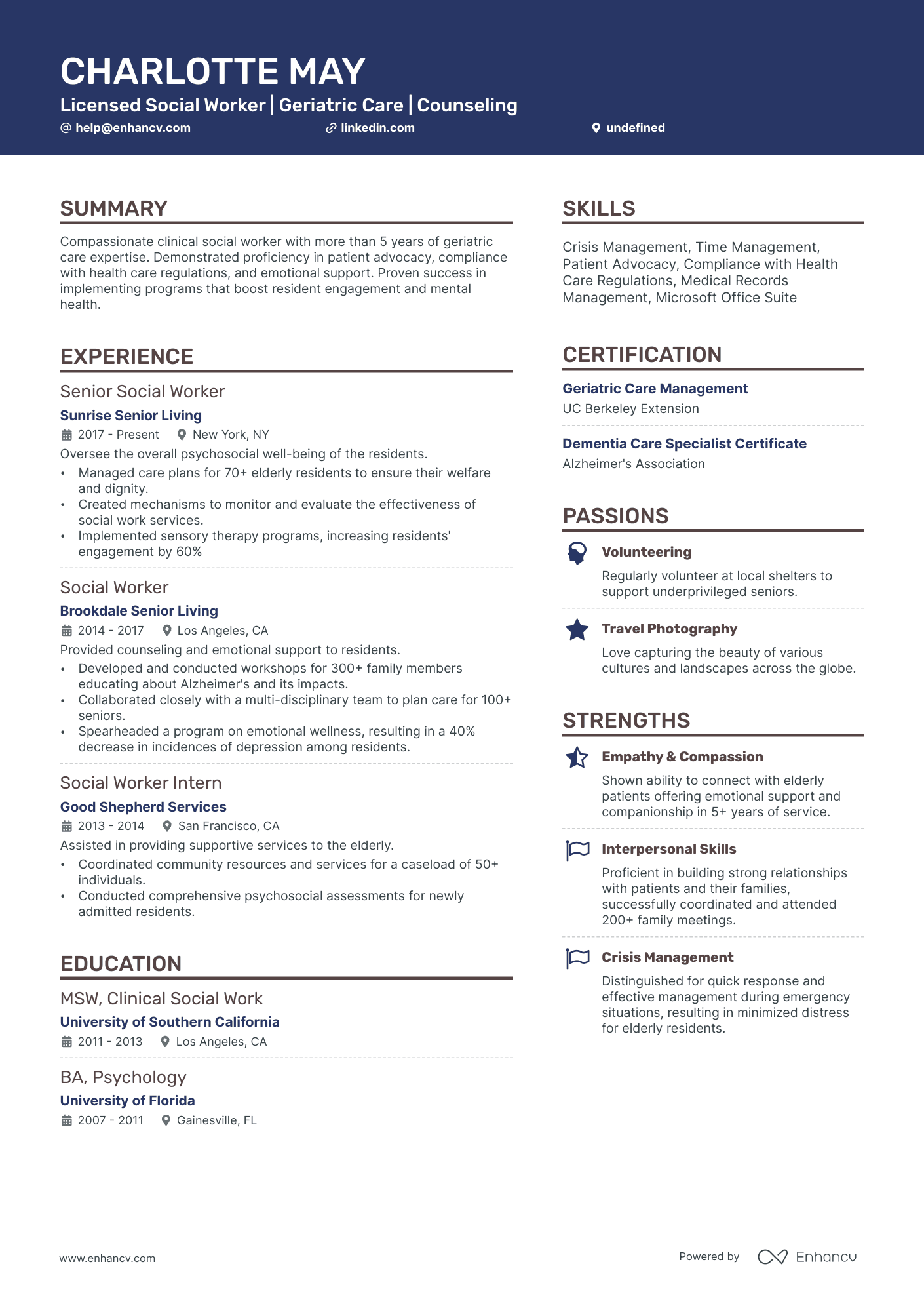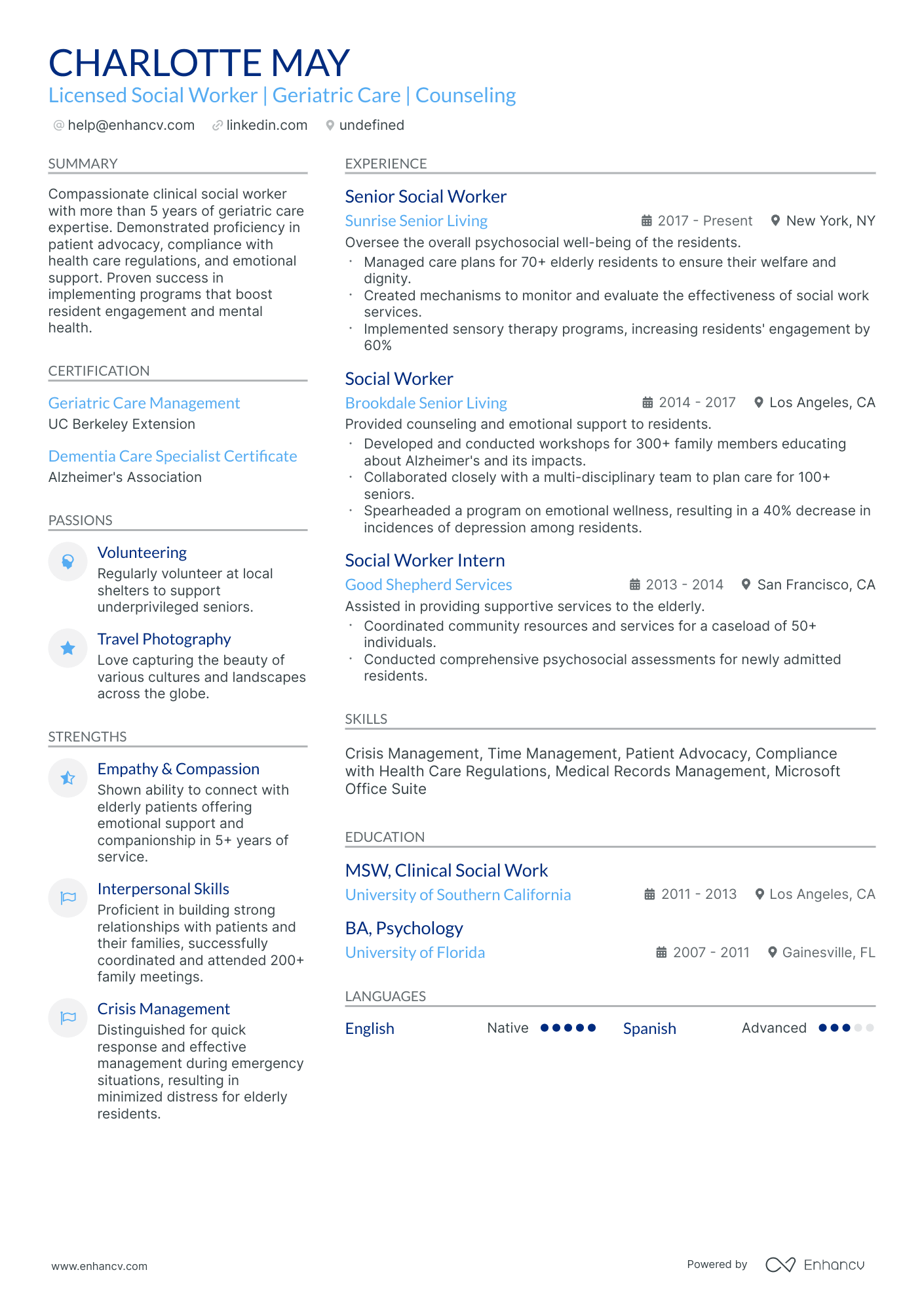Nursing home social workers often struggle to succinctly articulate the complexity and diversity of their responsibilities in a resume, which includes medical, emotional, legal, and financial assistance. Our guide can assist by providing specific examples and templates that highlight key skills and experience, helping to translate these multifaceted roles into concise, impactful statements that potential employers can easily understand and value.
Dive into this guide to learn how to craft a nursing home social worker resume that offers recruiters a clear view of your career journey:
- Draw from our nursing home social worker resume samples, highlighting top skills, certifications, and more.
- Illuminate the potential impact you can bring to an organization through your resume summary and experience.
- Spotlight your unique nursing home social worker expertise, emphasizing tangible results and standout achievements.
Recommended reads:
Formatting the layout of your nursing home social worker resume: design, length, and more
When it comes to the format of your nursing home social worker resume , you've plenty of opportunities to get creative. But, as a general rule of thumb, there are four simple steps you could integrate into your resume layout.
- If you have plenty of experience, you'd like to showcase, invest in the reverse-chronological resume format. This format focuses on your latest experience items and skills you've learned during your relevant (and recent) jobs.
- Don't go over the two-page limit, when creating your professional nursing home social worker resume. Curate within it mainly experience and skills that are relevant to the job.
- Make sure your nursing home social worker resume header includes all of your valid contact information. You could also opt to display your professional portfolio or LinkedIn profile.
- Submit or send out your nursing home social worker resume as a PDF, so you won't lose its layout and design.
Upload your resume
Drop your resume here or choose a file. PDF & DOCX only. Max 2MB file size.
Pro tip
Make sure your resume is ATS compliant and catches the recruiters' attention by tailoring your experience to the specific job requirements. Quantify and highlight why you're the best candidate for the role on the first page of your resume.
Essential sections for a standout social work intern resume:
- The top section should combine your header—with accurate contact details—and a concise summary or objective that encapsulates your professional achievements.
- An experience section that chronicles your career trajectory and how each role contributed to your professional development.
- Highlight significant achievements that demonstrate the practical application of your skills, leading to tangible results.
- Include industry-recognized certifications to underscore your technical proficiency or interpersonal skills.
- Detail your educational background relevant to the field.
What recruiters want to see on your resume:
- Experience in Geriatric Care: Details of your work history, specifically within elder care settings like nursing homes or assisted living facilities.
- Case Management Skills: Demonstrated experience managing multiple cases simultaneously, coordinating with other healthcare professionals, and efficiently organizing/prioritizing tasks.
- Knowledge of Federal and State Regulations: Understanding of the laws and regulations that govern nursing homes and elder care, such as the Older Americans Act or Medicaid regulations.
- Interpersonal and Communication Skills: Ability to interact effectively with residents, families, and staff, both verbally and written. Empathy and sensitivity towards the issues faced by the elderly are crucial.
- Certifications and Education: Relevant credentials, such as a degree in social work and licensure (LCSW, LSW), possibly with a focus on gerontology.
Recommended reads:
How to create the cornerstone experience section of your nursing home social worker resume
A meticulously crafted nursing home social worker resume experience section is a recruiter's delight. This segment not only responds to job criteria but also throws light on your technical expertise and character.
To craft an impactful experience section:
- Highlight roles directly related to the position in question.
- Pair each role or task with a metric that quantifies your achievements.
- Chronicle your nursing home social worker career progression, illustrating your dedication and growth in the domain.
- For each role, elucidate challenges faced, strategies employed, and the broader organizational impact.
Examine the following nursing home social worker samples to discern how seasoned professionals have articulated their experiences:
- Collaborated with a multidisciplinary team to develop personalized care plans for elderly residents.
- Conducted individual counseling sessions to address emotional and psychological needs of residents and their families.
- Organized and facilitated support groups for residents, providing a platform for social interaction and emotional support.
- Advocated for residents' rights and ensured adherence to ethical standards in long-term care facilities.
- Assessed residents' psychosocial needs and developed intervention plans to improve their quality of life.
- Collaborated with community organizations to coordinate educational programs on aging and elder abuse prevention.
- Conducted comprehensive assessments to identify residents' mental health issues and coordinated appropriate interventions.
- Developed and implemented recreational therapy programs to enhance residents' cognitive and social functioning.
- Provided crisis intervention services to residents and their families during emergency situations.
- Collaborated with medical staff to address the emotional and psychological impact of chronic illnesses on residents.
- Facilitated family meetings to discuss care plans, address conflicts, and promote effective communication.
- Developed and implemented an outreach program to connect isolated residents with community resources.
- Led a team of social workers in providing comprehensive psychosocial support to residents and families.
- Developed and implemented a dementia care training program for staff resulting in improved resident care outcomes.
- Collaborated with local authorities to establish a community-based respite care program for caregivers.
- Provided crisis counseling and emotional support to residents facing end-of-life decisions and grief.
- Coordinated discharge planning and facilitated smooth transitions for residents moving to alternative care settings.
- Promoted resident engagement through the development of volunteer programs and intergenerational activities.
- Implemented a mental health screening program resulting in early identification and intervention for residents at risk.
- Collaborated with interdisciplinary teams to manage complex cases and ensure continuity of care.
- Facilitated family education workshops on advance directives and long-term care planning.
- Developed and executed an individualized care plan for each resident, focusing on their psychosocial needs.
- Coordinated with community agencies to provide residents access to supportive services and resources.
- Provided grief counseling and facilitated bereavement support groups for residents and their families.
- Implemented a comprehensive discharge planning process resulting in reduced hospital readmission rates.
- Collaborated with interdisciplinary teams to address complex behavioral issues among residents with dementia.
- Developed policies and procedures to ensure compliance with state and federal regulations.
- Provided counseling services to residents struggling with mental health disorders, such as depression and anxiety.
- Advocated for improved communication and collaboration between healthcare providers and residents' families.
- Developed and delivered educational presentations on coping strategies for residents managing chronic pain.
The following content includes information from "O*NET OnLine" by the U.S. Department of Labor, Employment and Training Administration (USDOL/ETA). Used under the CC BY 4.0 license. The data represents the top responsibilities present on the task lists for nursing home social worker professionals.
Top Responsibilities for Nursing Home Social Worker:
- Advocate for clients or patients to resolve crises.
- Educate clients about end-of-life symptoms and options to assist them in making informed decisions.
- Collaborate with other professionals to evaluate patients' medical or physical condition and to assess client needs.
- Refer patient, client, or family to community resources to assist in recovery from mental or physical illness and to provide access to services such as financial assistance, legal aid, housing, job placement or education.
- Utilize consultation data and social work experience to plan and coordinate client or patient care and rehabilitation, following through to ensure service efficacy.
- Monitor, evaluate, and record client progress according to measurable goals described in treatment and care plan.
- Identify environmental impediments to client or patient progress through interviews and review of patient records.
- Counsel clients and patients in individual and group sessions to help them overcome dependencies, recover from illness, and adjust to life.
- Organize support groups or counsel family members to assist them in understanding, dealing with, and supporting the client or patient.
- Modify treatment plans to comply with changes in clients' status.
Quantifying impact on your resume
<ul>
Tips for nursing home social worker newcomers launching their careers
Lacking extensive experience for that nursing home social worker role? No worries.
Sometimes, hiring managers go for the unexpected candidate when they see potential.
Here's how to convince them you're the right fit:
- Opt for the functional skill-based or hybrid formats to highlight your unique professional value.
- Always tailor your nursing home social worker resume to emphasize the most critical requirements, usually listed at the top of the job ad.
- Compensate for limited experience with other relevant sections like achievements, projects, and research.
- In your nursing home social worker resume objective, pinpoint both your achievements and how you envision your role in the position.
Recommended reads:
Pro tip
Your experience section should be a testament to your professional growth. If your career journey isn't particularly linear or impressive, focus on detailing specific skills and the tangible outcomes of your responsibilities.
Nursing home social worker resume skills: showcasing both hard and soft skills
Your nursing home social worker resume should show recruiters your range of skills. List the tools and software you use (hard skills) and how they fit into your daily tasks. But don't stop there. Share the personal traits (soft skills) you've gained from your experiences. Here's how:
- Showcase three top career achievements.
- For each achievement, mention a hard and a soft skill you used.
- Highlight unique skills that set you apart.
- Discuss how your skills improved the workplace or team culture.
Check our list for popular hard and soft skills in the industry.
Top skills for your nursing home social worker resume:
Case Management Software
Electronic Health Records (EHR)
Assessment Tools
Social Work Management Systems
Documentation Software
Data Analysis Tools
Crisis Intervention Techniques
Discharge Planning Tools
Resource Referral Databases
Telehealth Platforms
Empathy
Communication
Active Listening
Problem-Solving
Conflict Resolution
Team Collaboration
Cultural Competence
Time Management
Adaptability
Emotional Intelligence
Next, you will find information on the top technologies for nursing home social worker professonals from "O*NET OnLine" by the U.S. Department of Labor, Employment and Training Administration (USDOL/ETA). Used under the CC BY 4.0 license.
Top technologies for Nursing Home Social Worker’s resume:
- Medical procedure coding software
- MEDITECH software
- Information presentation software
- Microsoft PowerPoint
- Command Systems ComServe
- Database software
Pro tip
If you're in the process of learning a pivotal skill for the role, mention this on your resume. It demonstrates initiative while maintaining transparency.
Highlighting nursing home social worker-specific certifications and education
Your resume education section can be a treasure trove of skills and experiences relevant to the role. Here are the best practices when it comes to featuring it on your resume:
- Highlight advanced qualifications, detailing the institution and duration.
- If you're currently pursuing a degree, mention your expected graduation date.
- Consider omitting unrelated degrees.
- If your academic journey boasts significant achievements, especially in research, elaborate on them.
What's more, shocasing relevant industry certifications can bolster your credibility, even if you lack extensive work experience.
To effectively present your certifications:
- Place pivotal industry certifications prominently in a dedicated section.
- If a certification is particularly impressive, consider featuring it near your name or within the header, summary, or objective.
- Provide details, where relevant, to underscore alignment with the role.
- Recent certifications should be given advantage, as they show your up-to-date knowledge.
Both education and certification sections highlight your commitment to professional growth, a trait valued by employers. Below, explore some of the most current and sought-after nursing home social worker certifications to enhance your application:
Best certifications to list on your resume
Pro tip
List your degrees in reverse order, starting with the newest. A recent PhD or unique field could set you apart.
Recommended reads:
Summary or objective: making your nursing home social worker resume shine
Start your resume with a strong summary or objective to grab the recruiter's attention.
- Use a resume objective if you're newer to the field. Share your career dreams and strengths.
- Opt for a resume summary if you have more experience. Highlight up to five of your top achievements.
Tailor your summary or objective for each job. Think about what the recruiter wants to see.
Resume summary and objective examples for a nursing home social worker resume
- With over a decade of experience in social work and 5 years dedicated to nursing home settings, I have enhanced the quality of life for aging residents using strong communication skills and a compassionate approach. Notable achievement includes improving community participation rates by 40% through engaging activity programs.
- As a certified social worker with 15 years of experience, I'm skilled at fostering relationships, identifying patient needs, and coordinating resources. At my previous role in a large city nursing home, my teamwork resulted in a 30% increase in resident satisfaction scores. Transforming elder care through empathy and dedication is my passion.
- Transitioning after a successful 8-year career as an occupational therapist, I bring a deep understanding of patient-centered care to the field of nursing home social work. My hands-on experience in rehabilitation and patient advocacy will be invaluable in creating personalized care plans for nursing home residents.
- Drawing from a 10-year background in mental health counseling, my transition to nursing home social work is motivated by a desire to focus on providing holistic, compassionate care to our elderly population. Expertise in assessment and treatment planning combined with strong interpersonal skills positioned me to excel in this new sector.
- Eager to apply my extensive volunteer experience with elderly individuals into a professional setting as a nursing home social worker. Driven by a commitment to enhance the lives of senior citizens, I aim to leverage my skills in active listening, empathy, and problem-solving to create meaningful impact.
- As a recent graduate with a Master's in Social Work, my goal is to contribute my academic knowledge and passion for elderly care to a nursing home setting. I am poised to employ my keen understanding of gerontology, case management, and resource coordination to improve the well-being of nursing home residents.
How to include other relevant sections for your nursing home social worker resume
Apart from the standard sections listed in this guide, you have the opportunity to get creative when building your profile.
Select additional resume sections that you deem align with the role, the department, or the company culture.
Here are the ones we recommend:
- Language skills - use a profficiency framework to indicate your aptitude level;
- Hobbies and interests - you can share more about your favorite books or how you spend your time. It's great for culture alignment;
- Volunteering - helps you highlight the causes you care about and hints at people skills you gained such as teamwork, emotional intelligence, and organizational skills;
- Awards - the space for your most prominent nursing home social worker professional accolades and achievements.
Make sure that these sections don't take too much away from your experience, but instead build up your nursing home social worker professional profile. You can add them as a second column to your resume, or on a second page.
Key takeaways
- Craft a nursing home social worker resume that's easy to read and aligns with the role's requirements.
- The top third of your resume should clearly convey your unique value proposition for the nursing home social worker role.
- Tailor your resume to the job, highlighting skills, achievements, and the tangible results of your efforts.
- Detail your certifications and technical skills to demonstrate proficiency with specific tools and technologies.
- The sections you choose should collectively present a comprehensive view of your professional expertise and personality.
